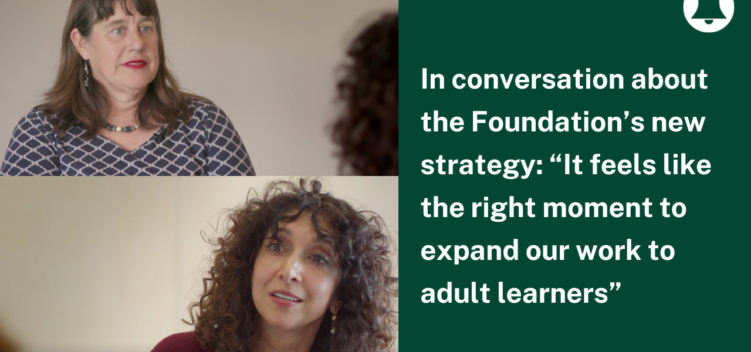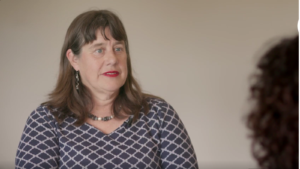In conversation about the Foundation’s new strategy: “It feels like the right moment to expand our work to adult learners”
The Bell Foundation is embarking on an exciting new chapter. In this blog, Diana Sutton, Director of The Bell Foundation, sits down with Radha Chakraborty, Chair of the Board of Trustees, to share reflections on our work to date with schools, insights into the Foundation’s bold new 2025-2030 strategy, and why now is the right time to scale up our work with young people and adults who don’t have English as their first language.

The Story of Frank Bell and The Bell Foundation
Radha: The Foundation has such an interesting history. Could you share more about it?
 Diana: Frank Bell, our founder, was taken prisoner during World War II and held in a Japanese POW camp. There, he and other inmates started an underground university, defying the rules of the camp by teaching one another valuable skills and languages as a means of survival in the camp. After the war, Frank returned to Cambridge, establishing The Bell Educational Trust and later the Bell School of Languages, which remains on our site today. In 2011, Trustees restructured the Foundation, making the school a commercial subsidiary and ensuring that the charitable mission stayed true to Frank Bell’s original vision. Today, we’re involved in work across prisons, refugee integration, and English language education.
Diana: Frank Bell, our founder, was taken prisoner during World War II and held in a Japanese POW camp. There, he and other inmates started an underground university, defying the rules of the camp by teaching one another valuable skills and languages as a means of survival in the camp. After the war, Frank returned to Cambridge, establishing The Bell Educational Trust and later the Bell School of Languages, which remains on our site today. In 2011, Trustees restructured the Foundation, making the school a commercial subsidiary and ensuring that the charitable mission stayed true to Frank Bell’s original vision. Today, we’re involved in work across prisons, refugee integration, and English language education.
New Strategy, New Horizons
Diana: Radha, everyone’s eager to hear about the Foundation’s new strategy. Could you share a little about it and why this is the right time for change?
Radha: Absolutely, Diana. Over the past few years, we’ve built a strong evidence base which has given us credibility, particularly in our policy and influencing work. We’re now recognised as one of the leading organisations in this area. At the same time, we’ve demonstrated that we can design practical initiatives that are scalable. If you look at our work with schools, it really makes a difference. And with this new strategy, it feels like the right moment to expand our work and extend our impact to adult learners.
Diana: That’s a major development. Why focus on adult learners now?
Radha: There are several reasons. Firstly, the increasing devolution across the UK is going to allow us to work directly with mayoral combined authorities. This could help unlock new skills pathways for adult learners. Secondly, we know from our research that adults, particularly those already in employment, face significant barriers to accessing education and training. They often struggle to find learning opportunities that fit around their lives. Our strategy will focus on making language education more accessible and more aligned to their real-world needs.
Challenges and Opportunities along the Way
Radha: As we embark on a new strategy period in the Foundation, what do you think are the key challenges that we face?
Diana: We’ve accomplished so much in schools, going from a desk and a phone, to operating on a national scale. Now, we have the same ambition for adult learners. However, we’re facing a changing policy environment and tighter budgets. The challenge will be to realise that ambition and prepare for what lies ahead.
Radha: And can you talk about some of the challenges that adult learners have around finding time for learning English while in full time employment? What can we do around that?
Diana: Yes, we’re currently running some exciting pilot projects exploring how adults can learn while working full-time. We need to look at innovative ways to be able to learn English while you’re working, or while you’re looking after children on indeed just as part of your day-to-day life. And that is what we really want to do through some of these partnerships.
Radha: How do you think we are going to affect system change when there is certain amount of disquiet and noise around refugees and migrants in the UK?
Diana: Well, migration is a global reality, driven by climate change and war. The reality is how do we facilitate integration and how can we see the opportunities. But also, a little-known fact is that many people who don’t have English as their first language or who don’t speak it proficiently are British citizens. So, it is not only a debate about refugees and migrants, it is also about what do we do to upskill the labour force who are UK citizens with low or no proficiency. Many can contribute to the economy, and the focus is how do we enable that at the right and accessible level of provision.
Radha: I agree, it is a much more nuanced picture than the headlines might indicate…
Diana: It is. And many people come and bring valuable skills, but they lack the language to exercise them. So, it is about how you get the provision that enables people to contribute with the skill sets that they bring, so they can unlock the abilities that they have and contribute to society.
Radha: With the increased devolution across the UK, what new opportunities do you see for us?
Diana: Devolution brings huge opportunities because it allows regions to adjust their provision to local need, whether that is a particular type of industry or employer in that area, or particular groups of learners who might not be accessing language provision. It also offers the opportunity for regions to learn from one another about what worked and what hasn’t.
The Power of Partnership
Radha: What do you think about the role of partnerships for us?
Diana: Partnerships are absolutely vital. We are a small organisation doing big things, so we rely on collaborations with universities, schools, multi academy trusts, local authorities, charities, and devolved authorities to achieve impact. We really do value those relationships. By bringing together diverse stakeholders, we’re able to create projects that have a real impact – sometimes bringing together groups that wouldn’t normally interact. There’s much to continue to do here.

